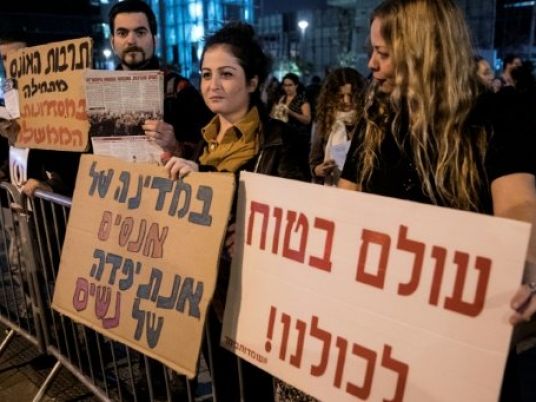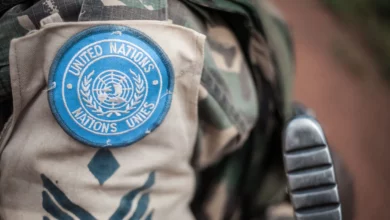
A string of high-profile sexual abuse cases has led to soul-searching in Israel, where women's increasing willingness to report such behaviour has collided with retrograde attitudes among some men, experts say.
In the most high-profile case, former president Moshe Katsav was freed from prison on parole in December after serving five years of a seven-year term for rape.
He had for years refused to show any remorse for his crimes.
A general, a former senior government official and a member of parliament are among other top-ranking Israelis who have come under suspicion of sex offences and whose cases have been recently in the spotlight.
Brigadier General Ofek Buchris resigned from the army in July after being charged with rape and other sexual offences.
He has since reached a plea bargain that saw him avoid jail time in exchange for admitting to consensual sex with a junior female soldier and conduct unbecoming an officer related to a second woman.
In a sign of increasing intolerance of such cases, reports of the plea bargain drew anger and protests.
A video of a song performed by four young women, all army veterans, went viral after its release on social networks.
Entitled "Buchris's Girls", the song is a remake of a 1995 anti-war song, with new lyrics slamming the army's alleged tendency to close ranks when threatened and the torrent of abuse directed at complainants on social media.
"You were like a blind herd of devotees, worshipping the commander," the four sang, dressed in army uniforms.
"We are just meat for the officers."
– 'Name names' –
Several hundred protesters recently rallied outside national defence headquarters in Tel Aviv, chanting "No means no! What part of that sentence don't you understand?"
Israeli National Theatre actress Noga Shahar, who organised the demonstration, said that women were becoming more willing to report sex crimes.
"It's not that there are suddenly more scandals," she told AFP at the protest.
"It's simply that women are understanding that they can speak up, make complaints, name names. But the judicial system doesn't follow up," she said.
"Judge Yitzhak Cohen was simply fined 2,500 shekels. It's revolting."
Shahar was referring to a Nazareth judge accused of forcing a court employee to sit on his lap and touching her under her blouse without her consent while in his chambers in 2010.
He has since resigned from the bench.
A plea bargain still under consideration would give Cohen a sentence of community service and order him to pay 2,500 Israeli shekels ($650/600 euros) in compensation to the complainant.
Those who work with victims agree with Shahar that the rise in reports stems from a greater willingness by women to come forward.
"You never know the real figures because most women don't even complain to the police," Orit Sulitzeanu, executive director of the Association of Rape Crisis Centres in Israel (ARCCI), told AFP.
Nevertheless, she says, the work of such centres and growing public awareness have brought about a "tsunami" in the numbers of victims who do complain.
"Women are bringing from the darkness into the light things which were always in the dark," she said.
– 'Macho' attitudes –
ARCCI data says that its centres received 9,197 fresh calls for help in 2015, a rise of 17 percent over the past five years from 7,858 in 2010.
Sulitzeanu does not have global data for sex offences but says there are factors that may be particularly significant in Israel.
One, she says, is the informality of the culture and the ease of access to people in high places.
"It's a society very much without distance," she says, with a certain degree of touching and hugging considered acceptable in Israel.
She says that compulsory military service for men and women also plays a role.
"The fact is that there is an army where many of the youngsters go at the age of 18," she says.
"Even today it's very, very hierarchic, macho, which affects all of Israeli society and also has a negative effect on abuse of authority and the opportunity for sexual harassment."
"From the army it spreads to the police and the workplace," she adds.
Haaretz in October reported a rise in the number of reports of rape that were investigated by the military police.
It said that in 2015, 12 rape complaints led to investigations, compared to eight in 2014 and five in 2013.
In 2015, a legal aid unit was set up for soldiers who have been victims of sexual offences. The first time it provided assistance, Haaretz said, was in the case of the woman who complained against Buchris.




